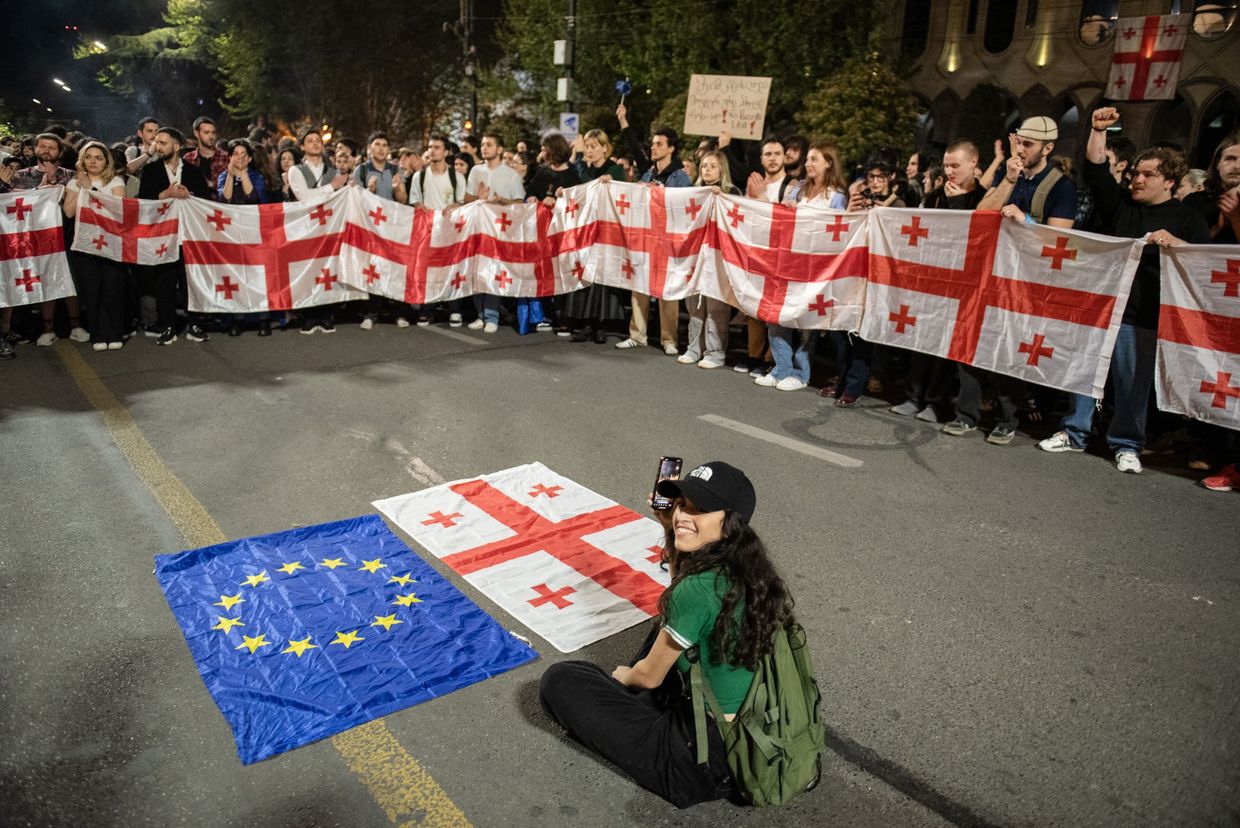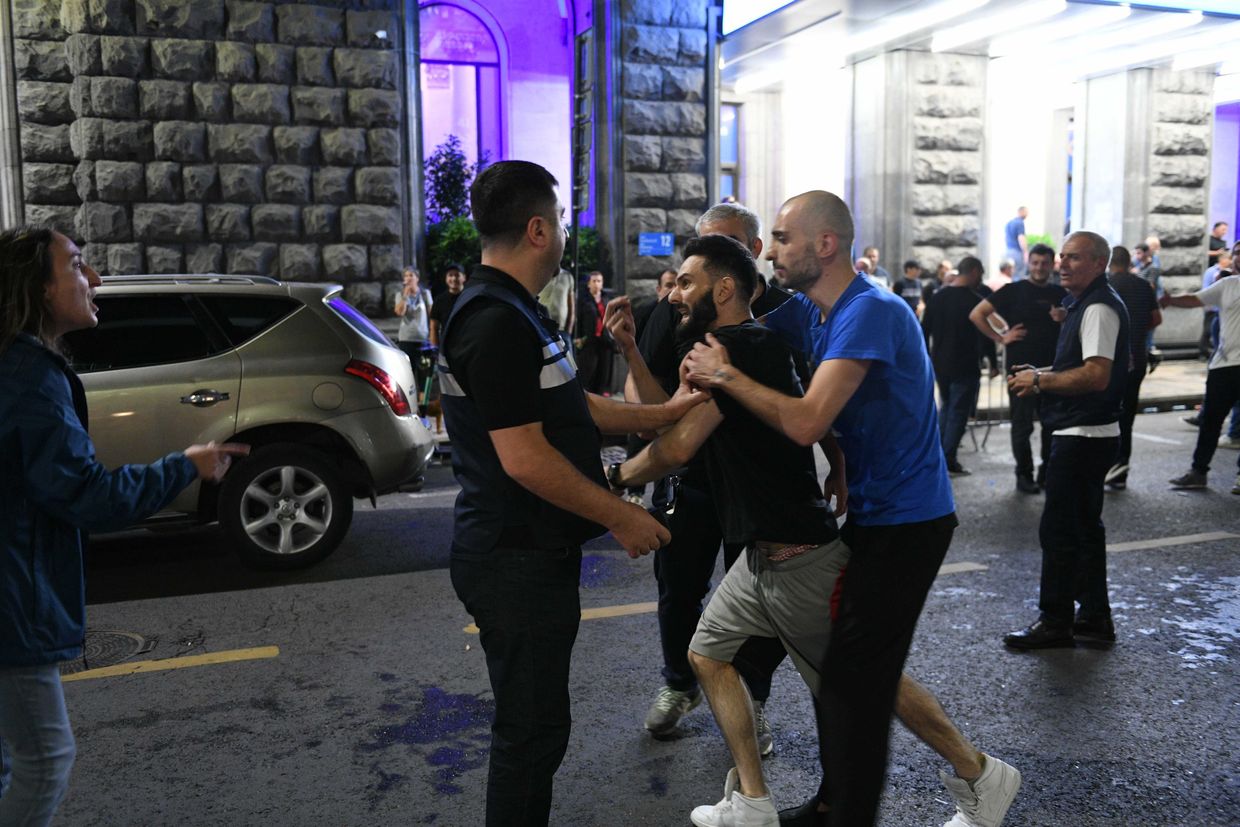
A Georgian protester has been detained while traveling to the coastal region of Adjara on charges of damaging Tbilisi Mayor Kakha Kaladze’s election campaign banner on Melikishvili Avenue in the capital. The charges carry a potential sentence of up to five years in prison.
The Interior Ministry reported on Wednesday it had arrested an individual identified as I.D., born in 2002, on charges of damaging or destroying property. The investigation was opened after one of Kaladze’s posters was splashed with yogurt, while others had the phrase ‘Russian Dream’ written on them, during a protest on Tuesday.
Local media later named the detained individual as 23-year-old student Megi Diasamidze, which was subsequently confirmed by her family.
‘My sister, Megi Diasamidze, and my comrade-in-arms are being detained. The regime is trying to intimidate us with these methods, which is why we must fight even harder so that Megi and all political prisoners are free by the end of the year!’, Diasamidze’s sister, Neli Diasamidze, wrote on Facebook Wednesday night, as quoted by Publika.

Megi Diasamidze’s lawyer, Shota Tutberidze, told TV Pirveli that Diasamidze was arrested under ‘very funny’ circumstances, alleging they were dealing with a ‘primitive, personal Georgian “special operation” from the time of [First Secretary of the Georgian Communist Party and former President Eduard] Shevardnadze’.
According to Tutberidze, Diasamidze was traveling to Adjara to spend a few days with her family when her minibus ‘miraculously’ broke down in the western town of Lanchkhuti.
‘Suddenly, the minibus was stopped by a patrol. The patrol first argued with the minibus driver about some trivial violation, and after receiving some instructions, he surrounded the car’, Tutberidze said.
Officers then took Diasamidze’s phone before ordering her out of the vehicle and into a patrol car.
‘Megi’s hands were tied for nine hours. And there are even traces of handcuffs on the handcuffs. This is not a serious injury, but it once again emphasises the unpreparedness and cowardice of those who arrested her and took her to Tbilisi’, Tutberidze said.
On Thursday, the chair of the Georgian Young Lawyers’ Association (GYLA), Nona Kurdovanidze, emphasised in a post on Facebook that Diasamidze’s actions were ‘neither a crime nor a violation of the law’.
‘At most, a civil lawsuit could be filed against her, even if it were necessary to incur some expense to remove the inscription on that poster, for example, purchasing cleaning supplies’, Kurdovanidze wrote, noting that the article Diasamidze is being charged under refers to significant damage being caused.
‘In this case, the poster was not destroyed, it is still displayed. The poster cannot even be considered damaged, because the inscription on it was quickly and easily removed’.
Kurdovanidze also highlighted that anything depicting a person participating in the elections or their election participation number is considered campaign material, which has its own regulations. In particular, the election code ‘categorically prohibits the placement of campaign materials on buildings with the status of cultural heritage’, yet the building Kaladze’s banner was displayed on has been marked as such by the official state-administered portal.
‘Accordingly, displaying campaign material on this building is prohibited and may be considered a defacement of the building. Defacement of the building is an administrative offence and results in a fine for the person who posted the poster’, Kurdovanidze wrote.
Similar, Saba Brachveli, Human Rights Programme Manager at the Civil Society Foundation, took to Facebook on Thursday to highlight that damage to an election banner is an administrative offence, punishable by a fine of ₾1,000 ($370). He noted that then-Georgian Dream Parliamentary Chair Mamuka Mdinaradze had even referred to such an action as an administrative violation in 2024.
‘No one has been punished for spraying paint on the offices of opposition parties or NGOs’, Brachveli emphasised in his post.
Later on Thursday, Kaladze told journalists that ‘there is a law that will definitely be enforced’.
‘The fact is very bad. No radical should be given the opportunity. What if I came to your house and damaged your house?’, Kaladze asked rhetorically.
He added that while he saw other people damaging his election banner, only Diasamidze was arrested as the others could not be identified.
Kaladze also claimed that it was ‘a lie’ that his banner was hung illegally.
‘This does not require a permit from the municipality. This requires the owner's permission, and of course we have that, because we have rented the space. We have rented it so that the election headquarters can be opened, and of course, the condition that banners be hung is not a problem at all’, Kaladze said.In turn, Prime Minister Irakli Kobakhidze told journalists Diasamidze was a ‘titushka’ — the female version of a slang term of Ukrainian origin traditionally used to describe plainclothes security forces used to attack government critics.












